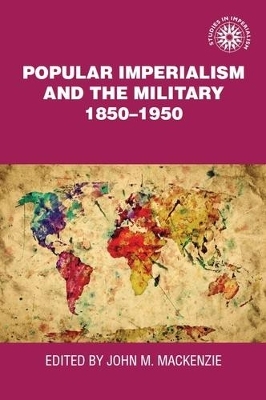
Popular Imperialism and the Military, 1850-1950
Manchester University Press (Verlag)
978-0-7190-3358-2 (ISBN)
- Titel ist leider vergriffen;
keine Neuauflage - Artikel merken
Colonial war played a vital part in transforming the reputation of the military and placing it on a standing equal to that of the navy. The book is concerned with the interactive culture of colonial warfare, with the representation of the military in popular media at home, and how these images affected attitudes towards war itself and wider intellectual and institutional forces. It sets out to relate the changing image of the military to these fundamental facts. For the dominant people they were an atavistic form of war, shorn of guilt by Social Darwinian and racial ideas, and rendered less dangerous by the increasing technological gap between Europe and the world. Attempts to justify and understand war were naturally important to dominant people, for the extension of imperial power was seldom a peaceful process. The entertainment value of war in the British imperial experience does seem to have taken new and more intensive forms from roughly the middle of the nineteenth century. Themes such as the delusive seduction of martial music, the sketch of the music hall song, powerful mythic texts of popular imperialism, and heroic myths of empire are discussed extensively. The first important British war correspondent was William Howard Russell (1820-1907) of The Times, in the Crimea. The 1870s saw a dramatic change in the representation of the officer in British battle painting. Up to that point it was the officer's courage, tactical wisdom and social prestige that were put on display. -- .
John MacKenzie is Emeritus Professor of Imperial History, Lancaster University and holds Honorary Professorships at Aberdeen, St Andrews and Stirling, as well as an Honorary Fellowship at Edinburgh.
Delusive seduction - pride, pomp, circumstance and military music, Robert Giddings; "We carved our way to glory" - the British soldier in music hall song and sketch, circa 1880-1914, David Russell; popular imperialism and the image of the army in juvenile literature, Jeffrey Richards; heroic myths of empire, John M.MacKenzie; war correspondents and colonial war, circa 1870-1900, Roger T.Stearn; officer material - representations of leadership in late-19th-century British battle paintings, Paul Usherwood; the world on fire - pyrodramas at Belle Vue Gardens, Manchester, circa 1850-1950, David Mayer; the Hendon air pageant, 1920-1937, David Enrico Omissi.
| Erscheint lt. Verlag | 30.1.1992 |
|---|---|
| Reihe/Serie | Studies in Imperialism |
| Zusatzinfo | b&w half-tones |
| Verlagsort | Manchester |
| Sprache | englisch |
| Themenwelt | Geschichte ► Teilgebiete der Geschichte ► Wirtschaftsgeschichte |
| Sozialwissenschaften ► Politik / Verwaltung | |
| ISBN-10 | 0-7190-3358-6 / 0719033586 |
| ISBN-13 | 978-0-7190-3358-2 / 9780719033582 |
| Zustand | Neuware |
| Haben Sie eine Frage zum Produkt? |
aus dem Bereich


